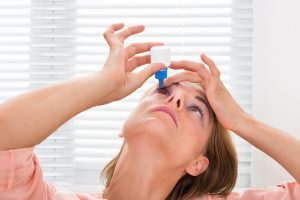 October 12 is World Arthritis Day, so we share with you some of our articles discussing arthritis and related topics such as dry eyes, rheumatoid arthritis, osteoarthritis, Alzheimer’s disease, psoriasis, and psoriatic arthritis.
October 12 is World Arthritis Day, so we share with you some of our articles discussing arthritis and related topics such as dry eyes, rheumatoid arthritis, osteoarthritis, Alzheimer’s disease, psoriasis, and psoriatic arthritis.
World Arthritis Day has been around since 1996. It is intended to raise awareness about arthritis, to influence policy makers, and to inform patients and caregivers about the support and treatment available. There are over 100 different types of arthritis, many of which can lead to disability and turn out to be a very costly matter to treat. The research on arthritis treatment is ongoing, so it’s important to be in the know.
Dry eye symptoms reduced by rheumatoid arthritis drug: Study
Advertisement
Dry eye symptoms may be reduced by a rheumatoid arthritis drug. Dry eye disease (DED) can lead to visual disturbances and can potentially cause damage to the ocular surface, negatively affecting one’s quality of life. About nine million Americans live with dry eyes and estimated costs hover around $55 million in direct and indirect costs.
The study conducted by the researchers from the Massachusetts Eye and Ear, Harvard Medical School, and Brigham and Women’s hospital shows that topical anakinra, which is an approved treatment for rheumatoid arthritis, significantly reduces dry eye symptoms.
Senior author Reza Dana said, “We began looking at the possible therapeutic effects of IL-1Ra over 10 years ago in my laboratory. This clinical trial was a significant milestone in our research. The results clearly show us not only that we can possibly help the millions of people affected by dry eye disease worldwide, but that biologics such as this have the potential to provide targeted therapies for other ocular ailments, as well.” Continue reading…
 Rheumatoid arthritis and insomnia linked to depressive symptoms, fatigue, and disability
Rheumatoid arthritis and insomnia linked to depressive symptoms, fatigue, and disability
Rheumatoid arthritis (RA) and insomnia linked to depressive symptoms, fatigue, and disability. The findings of the study suggest that addressing sleep issues in rheumatoid arthritis patients may improve depressive symptoms, fatigue, and disability.
The study was a cross-sectional examination of the relationship between sleep quality and rheumatoid arthritis, involving 162 rheumatoid arthritis patients.
The participants completed the following questionnaires: Pittsburgh Sleep Quality Index (PSQI), Beck Depression Inventory-II, Medical Outcomes Study Short Form – 36, and the Health Assessment Questionnaire. The results provided input on their sleep quality, depression, fatigue, and functional disability and pain severity, respectively. Patients also provided sociodemographic information and their medical history.
Lead author Dr. Faith S. Luyster said, “The primary finding of our study is that poor sleep quality is associated with greater functional disability among patients with RA, and this relationship may be explained by pain severity and fatigue. These results highlight the importance of addressing sleep complaints among patients with RA. By treating sleep problems, either pharmacologically or behaviorally, symptoms and activity limitations associated with RA may be reduced.” Continue reading…
 Osteoarthritis knee pain relief at home: Easy tips and natural remedies
Osteoarthritis knee pain relief at home: Easy tips and natural remedies
Osteoarthritis knee pain relief at home can be achieved through natural remedies directed at easing the knee pain. Osteoarthritis is a type of arthritis caused by wear and tear. Over time, the cartilage that cushions the bones of the joint wears thin, causing bone-on-bone friction. This is what causes the pain experienced in osteoarthritis.
When cartilage gets damaged or destroyed, it cannot repair itself, so it’s important to partake in preventative measures to minimize the wear and tear of the cartilage.
Factors that increase a person’s risk for osteoarthritis knee pain include older age, heredity, being a female, repetitive stress on the joints, athletics, and other illnesses, like rheumatoid arthritis and metabolic disorders. Continue reading…
 Old rheumatoid arthritis drug Salsalate offers new hope to treat Alzheimer’s disease: Study
Old rheumatoid arthritis drug Salsalate offers new hope to treat Alzheimer’s disease: Study
Old rheumatoid arthritis drug salsalate offers new hope to treat Alzheimer’s disease. The findings come from researchers at the Gladstone Institutes who found that salsalate effectively reverses tau-related dysfunction in an animal model of frontotemporal dementia (FTD). The drug also effectively prevented the accumulation of tau in the brain (characteristic of Alzheimer’s disease) and protected against cognitive impairments resembling those in Alzheimer’s and FTD.
Acetylated tau is found to be particularly toxic to the brain. Administered in mice, salsalate successfully reversed these toxic effects, not only lowering tau protein levels in the brain, but also improving memory impairments and protecting against atrophy of the hippocampus. Continue reading…
 Psoriasis and psoriatic arthritis patients receiving biologics therapy show reduction in depression and insomnia
Psoriasis and psoriatic arthritis patients receiving biologics therapy show reduction in depression and insomnia
Advertisement
Psoriasis and psoriatic arthritis patients receiving biologics therapy show reduction in depression and insomnia. The National Psoriasis Foundation states that individuals affected by psoriasis or psoriatic arthritis are at a higher risk of depression, compared to the general public. Symptoms of depression include insomnia and anxiety, which causes patients to use high amounts of antidepressants.
The researchers identified 980 patients with psoriasis or psoriatic arthritis receiving biologics therapy. The researchers compared rates of patients taking medications for depression and insomnia before and after biologics therapy.
Prior to biologics treatment, 20 percent of patients were taking antidepressants. After two years of biologics, there was over a 40 percent reduction in antidepressant use. Continue reading…
